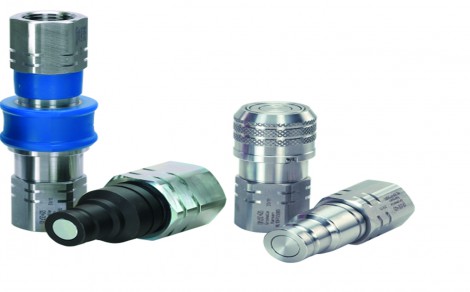- Home » Editorial » Hydraulics
The case for aluminium

Christian Kuenstel (pictured), product manager, connectors EMEA of Eaton, looks at the importance of material selection in couplings for liquid-cooling systems.
Increasing numbers of vehicle, machinery and equipment OEMs are utilising liquid cooling in their electrical systems due to the fact that it transfers heat far more efficiently than air, helping to ensure the safe and effective operation of system components at stable temperatures.
It is commonly assumed that plastic is the most cost-effective option for couplings in liquid-cooling applications, while its lightweight nature makes it the only choice. However, aluminium flat-face couplings now offer a viable alternative in a wide variety of liquid-cooling systems. For instance, in the industrial machinery market, liquid cooling can be found on laser-cutting, injection-moulding and drilling machines.
Transportation is another exponent of this technology; for applications such as motor pre-heat systems on buses, as well as electrical converters in railway rolling stock. In the renewable energy sector, liquid cooling is utilised for turbines at water plants, and in the converters employed by wind turbines and solar plant. Water cooling for mainframe computers in data centres, and fuel cells used in the broadcasting industry, are among numerous further applications for this increasingly popular solution.
Environmental exposure
Environmental exposure to UV/sunlight or extreme cold is a known cause of premature degradation in plastic couplings. As a result, users can sometimes experience early breakage, which not only creates potential technical problems in the application, but difficult-to-clean spillages. In comparison, the latest aluminium couplings, such as the ABD flat-face series from Eaton, provide high strength, endurance, corrosion resistance and life expectancy, while retaining light weight characteristics.
Vibration
As a result of material characteristics, plastic couplings offer lower connection strength than metallic counterparts. In short, the connection can break more easily under the vibration conditions typically experienced in liquid-cooling applications. It is also possible for plastic couplings to disconnect above a certain temperature level.
Aluminium provides the solution as it offers high resistance to mechanical stress, which in turn provides a strong connection under both continuous vibration and heat. In fact, the latest aluminium couplings provide a minimum safety factory of 4 (for a working pressure of 25 bar).
Flow
Although liquid-cooling is typically a low-pressure application, flow is an important consideration in the selected coupling as pressure drops can cause the fluid to heat up, reducing the efficiency of cooling systems. Here, an aluminium coupling with a flat-face design offers 29-62% higher flow (depending on the specific application) in comparison with ISO 16028 requirements. This performance enables any drops in flow to be reduced, ultimately improving the efficiency of the cooling system.
The installed space
It is notoriously difficult to connect couplings when access or visibility are restricted, which is often the case in many modern liquid-cooling systems. Couplings such as the Eaton ADB have a convenient pre-guiding system which helps users to pre-position the coupling before connection, without seeing. The inherent ease-of-use of this push-fit connection system both simplifies and accelerates the maintenance process in awkward access applications, which in turn boosts uptime. Colour-coding is another advantage of aluminium couplings, a feature that promotes connecting without mistakes.
-
PPMA 2025
23 September, 2025, 9:30 - 25 September, 2025, 16:00
NEC, Birmingham UK -
Advanced Engineering Show 2025
29 October, 2025, 9:00 - 30 October, 2025, 16:00
NEC, Birmingham UK










